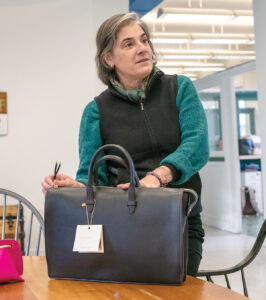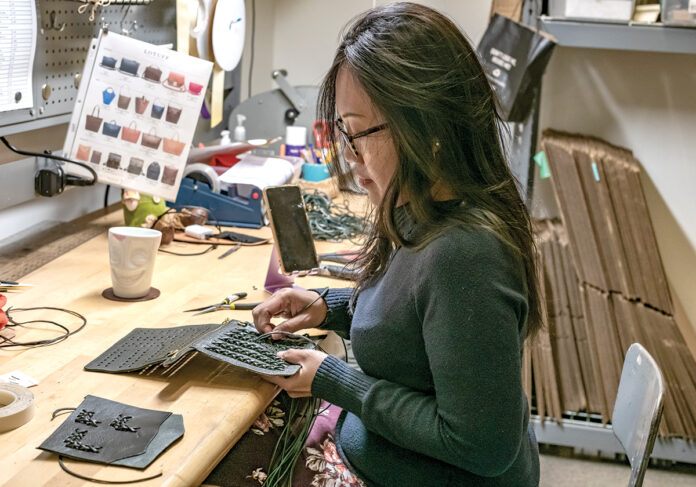(Editor’s note: This is the fourth installment in a monthly series highlighting some of the region’s unsung manufacturers that make products essential to the economy and, in many cases, our way of life. Other installments can be read here.)
At a glance, a Lotuff Leather bag isn’t obvious to someone unfamiliar with the brand. The company intentionally keeps the name off the exterior of most of its products, sometimes opting for a more subtle stamping on some of its smaller items.
The idea is to instead create an heirloom-quality product that prompts people who come across a Lotuff bag to ask who made it, says CEO Mary Lotuff Feeny.
“Our goal is to be classic, understated, a lifetime carry,” Lotuff Feeny said. “Something you’re not going to get sick of. Something you’re not going to wear out. Something that becomes a staple of your life.”
Though a relatively young company, co-founded in 2011 by Lotuff Feeny’s brothers, Joe and Rick Lotuff, the brand has established a name for itself in the designer leather goods market.
The company has earned this reputation through a process that merges manufacturing with artistry, Lotuff Feeny says. All products are cut by hand and go through a multifaceted design and production process in the company’s studio in the Valley section of Providence.
“Everyone in the studio has an artist’s eye,” Lotuff Feeny said. Every day, hundreds of decisions go into preparing and crafting the bags. Many of the company’s dozen or so employees have an art or design background – including studio manager Sarah Brenneman, a Rhode Island School of Design graduate.
One day in December, Brenneman was at a Lotuff workstation meticulously smoothing rough edges on products with layers of traditional Italian leather paint.
Elsewhere in the studio, workers were absorbed in other tasks, cutting around scarring and tick bites in hides, which appear as small, dark dots on the leather. One employee, Theresia Joseph, weaved thin leather strips into a braided handle on one bag – a process that can take up to six hours.
Each task involves specific skills, Lotuff Feeny says, and employees focus on depth of skill, rather than breadth. Most are trained in particular tasks and don’t learn to operate every machine.
From start to finish, a bag typically takes around three to eight weeks to make its way through all the stations before it’s finished, individually or within a batch, Lotuff Feeny says. In a pinch, workers can complete a bag in a day.
Most of the company’s sales are direct to consumers, though Lotuff products are available in several boutiques in the U.S. and Canada.
Some small accessories such as credit card wallets sell for $125 or $150, while prices on more complex products run into the thousands of dollars. The brand’s signature “Triumph” briefcase retails for $1,400.
The focus on craftsmanship has paid off.
Some customers have made a gifted Lotuff product into a family tradition, and the brand has gotten attention among the famous. Actor Rami Malek is a customer, and actress Selena Gomez’s character in the Hulu TV series “Only Murders in the Building” regularly carries a Lotuff bag.
TACTILE TASKS
[caption id="attachment_425989" align="alignleft" width="316"]

JOY OF LEARNING: Lotfuff Leather CEO Mary Lotuff Feeny said the joy of her role at the handmade leather goods manufacturer is “the learning and the applying of knowledge in general to a specific product.”
PBN PHOTO/MICHAEL SALERNO[/caption]
To Lotuff Feeny, the handmade aspect of the bags is more than just a selling point.
She and her siblings “were taught to work with our hands by our parents,” Lotuff Feeny said. “We think it’s an important thing to be able to do.
“It’s a life skill that informs all other spaces inside your head and working with your hands sort of clears your head and builds your head,” she said, “and allows you to puzzle solve, allows you to be connecting tactile and nontactile thoughts inside you.”
Manufacturing and design have played a large part in Lotuff Feeny’s family history: her grandparents were clothing manufacturers, and her father made clothing for national brands in the 1970s. Lotuff Feeny’s parents later went on to produce women’s sportswear, and in the 1990s they founded Berkshire Blanket Co. in Ware, Mass.
When her parents sold the blanket company in 2006, Lotuff Feeny’s brothers decided they still wanted to produce American-made goods. Despite their textiles background, they became interested in leather goods and co-founded Lotuff in 2011, initially focusing on briefcases. Three years later, the company expanded to women’s handbags and accessories.
Initially, Lotuff Feeny set off on a different path.
After graduating from Roger Williams University School of Law, and working at her family’s blanket company, she changed course when she became president of the Vincent Club, a Boston nonprofit focused on women’s health and well-being.
When her term ended at the nonprofit, Lotuff Feeny’s brothers – who were stepping down from their executive roles but remaining involved with the company – asked her to join Lotuff Leather. Though Lotuff Feeny hadn’t previously worked with leather, she hoped to bring a fresh perspective to the business.
The task became more challenging than Lotuff Feeny imagined: shortly after she took over in early 2020, the COVID-19 pandemic hit.
“Instead of imagining our future, we were imagining survival,” she said. “And in the process, we went into our survival skills.”
SURVIVAL MODE
When the crisis started in March 2020, Lotuff had to make do with just five workers in its studio due to social distancing requirements, compared with the more than 20 it would typically employ.
Leather sales sank and some of Lotuff’s remaining wholesale partners shuttered, so the company temporarily halted its normal production, focusing instead on manufacturing medical-grade masks and face shields for hospitals and individual consumers.
The company resumed production of leather goods in August 2020 and avoided later shortages of cow leather thanks to orders placed prior to the supply chain problems that rattled most industries in 2021. Shortages of other materials such as zippers had Lotuff scrambling, but the company was able to find a California manufacturer offering high-quality hardware.
Lotuff has bounced back to pre-pandemic sales levels in many areas, Lotuff Feeny says, with growth in certain styles, more repeat customers and increased corporate giving. Lotuff saw more than 20% sales growth during the first half of 2022. While sales figures in recent months have been stable, Lotuff Feeny acknowledges the uncertainties in the global economy have been challenging at times.
“There have been weeks that were way down, with the way the economy is around the world, and there are weeks that have been doubled,” Lotuff Feeny said. She declined to give annual sales figures but said the company surpasses $1 million yearly.
About six months ago, Lotuff also had to find a new location when the landlord of its original Providence studio, at 1 Sims Ave., wanted the space for another use. Lotuff moved its operations a short distance away to a building on Acorn Street.
The company is also still rebuilding its team. Four employees remain from before the pandemic, and the total headcount stands at about 12 to 15 full- and part-time employees on staff now.
Lotuff Feeny says she’s spent a lot of time training new employees recently, although she says she “was as much a learner as everyone else in this studio,” having joined the company in 2020.
“But for me, that’s the joy of this,” she continued. “It’s the learning and the applying of knowledge in general to a specific product. Because at the end of the day, it doesn’t matter what the product is – it matters that you’re committed to the teamwork and the process and the techniques.”













